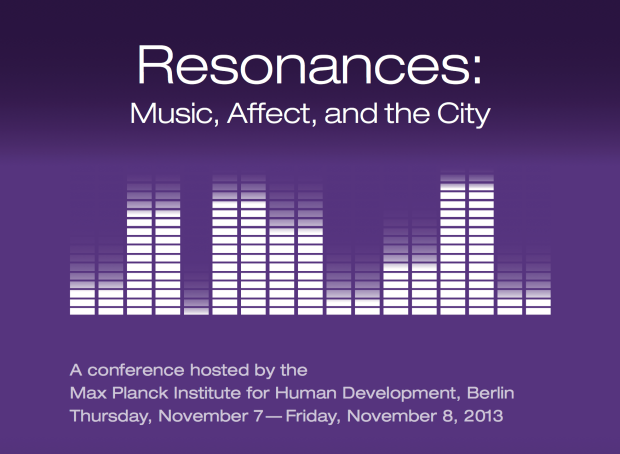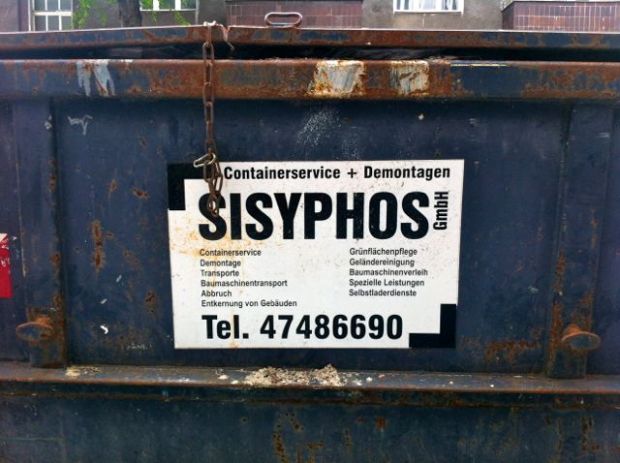 ast week, I organized a two-day conference here in Berlin, which took the affective dimensions of urban soundscapes as its central theme. Running November 7th–8th at the Max Planck Institute for Human Development, the conference featured a mix of scholarly presentations and discussion panels that included professionals out of Berlin’s local music scene, as well as music/sound-related evening events (see the conference program at the end of this post). I’m still recovering from the whole thing (as well as from an opportunistic flu that jumped into my body as soon as the conference came to a close), but I wanted to post some of my impressions of the conference, while they are still vivid in my memory. Considering the vanishingly small operating budget and a similarly tight planning period, I’m somewhat amazed I was able to pull it off at all.
ast week, I organized a two-day conference here in Berlin, which took the affective dimensions of urban soundscapes as its central theme. Running November 7th–8th at the Max Planck Institute for Human Development, the conference featured a mix of scholarly presentations and discussion panels that included professionals out of Berlin’s local music scene, as well as music/sound-related evening events (see the conference program at the end of this post). I’m still recovering from the whole thing (as well as from an opportunistic flu that jumped into my body as soon as the conference came to a close), but I wanted to post some of my impressions of the conference, while they are still vivid in my memory. Considering the vanishingly small operating budget and a similarly tight planning period, I’m somewhat amazed I was able to pull it off at all.
Plans for this conference first arose last July, (more…)


 he image of the industrial economy as a great machine oiled by the sweat and blood of its workers has been a common trope for Marxist and anti-capitalist writers. Much has changed since the industrial revolution inspired such metaphors, but the costs of lubricating social processes remains a relevant issue in these post-industrial, accelerated, and uncertain times. Based on the last two decades of social and cultural studies, one could gather that the world we live in is becoming increasingly fluid (Bauman) and mobile (Urry). But what enables social and cultural “matter” to flow at increasing rates?
he image of the industrial economy as a great machine oiled by the sweat and blood of its workers has been a common trope for Marxist and anti-capitalist writers. Much has changed since the industrial revolution inspired such metaphors, but the costs of lubricating social processes remains a relevant issue in these post-industrial, accelerated, and uncertain times. Based on the last two decades of social and cultural studies, one could gather that the world we live in is becoming increasingly fluid (Bauman) and mobile (Urry). But what enables social and cultural “matter” to flow at increasing rates?

 ust yesterday, I was waiting to meet an academic colleague for an afternoon Kaffee und Kuchen (coffee and cake, something of a German ritual). I was out in Dahlem—a southern suburb of Berlin and the home of the Freie Universität—sitting on the outdoor patio of a café at corner of Garystraße and Ihnestraße. Aux Délices Normands, it was called; pretty solid French pastries and cakes, lackluster coffee, pleasant seating.
ust yesterday, I was waiting to meet an academic colleague for an afternoon Kaffee und Kuchen (coffee and cake, something of a German ritual). I was out in Dahlem—a southern suburb of Berlin and the home of the Freie Universität—sitting on the outdoor patio of a café at corner of Garystraße and Ihnestraße. Aux Délices Normands, it was called; pretty solid French pastries and cakes, lackluster coffee, pleasant seating.
 K, so I originally thought this blog post would be a short little summary of my very first May Day in Berlin, but when I sat down and wrote out my notes the next day, I produced pages and pages of text. So, this is my attempt to reduce everything down to a brief narrative with some pretty pictures. But I won’t keep you in suspense: I wasn’t teargassed or pepper-sprayed or tasered. Most of my day was actually spent wandering around the MyFest street-fair, dancing at a few open-air events, and hanging out with friends. Even the infamous “18Uhr Demo” was mostly peaceful—at least until the end. (Slideshow of 51 images at the end of this article.)
K, so I originally thought this blog post would be a short little summary of my very first May Day in Berlin, but when I sat down and wrote out my notes the next day, I produced pages and pages of text. So, this is my attempt to reduce everything down to a brief narrative with some pretty pictures. But I won’t keep you in suspense: I wasn’t teargassed or pepper-sprayed or tasered. Most of my day was actually spent wandering around the MyFest street-fair, dancing at a few open-air events, and hanging out with friends. Even the infamous “18Uhr Demo” was mostly peaceful—at least until the end. (Slideshow of 51 images at the end of this article.) 
 t just so happens that
t just so happens that 
 eudi à jeudi, de retour à Paris. I haven’t been back to Paris in more than 1.5 years, which is pretty much the longest stretch of time I’ve been away from this city since the first time I came to do dissertation fieldwork in 2006. My last visit was really just a brief week-long visit (much like this one), so it’s really been 2.5 years or so since I’ve actually lived in this city.
eudi à jeudi, de retour à Paris. I haven’t been back to Paris in more than 1.5 years, which is pretty much the longest stretch of time I’ve been away from this city since the first time I came to do dissertation fieldwork in 2006. My last visit was really just a brief week-long visit (much like this one), so it’s really been 2.5 years or so since I’ve actually lived in this city.
 rüße aus Berlin! I made it back to Berlin after the
rüße aus Berlin! I made it back to Berlin after the 
 ise Waxer was an ethnomusicologist of salsa music, respected and admired for her critically-acclaimed book tracing the development of salsa music, vinyl recordings, and memory in Colombia, entitled,
ise Waxer was an ethnomusicologist of salsa music, respected and admired for her critically-acclaimed book tracing the development of salsa music, vinyl recordings, and memory in Colombia, entitled, 
 ey folks, salut de Montréal! I’ve had “write articles for blog” on my to-do list for the last month or so, but then real life keeps on being inconvenient. At the moment, I’m in Montréal for the AAA meeting (
ey folks, salut de Montréal! I’ve had “write articles for blog” on my to-do list for the last month or so, but then real life keeps on being inconvenient. At the moment, I’m in Montréal for the AAA meeting (